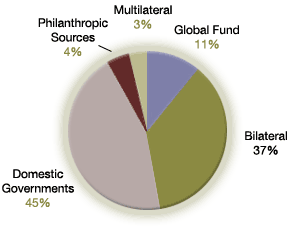 This isn’t surprising:
This isn’t surprising:
A $21.7 billion health fund championed by the rich and famous has come under harsh scrutiny amid revelations it’s bleeding money to corruption. But fund officials and outside experts in the field have a stark message for global development: other aid agencies are in much worse shape.
Investigations led by Robert Appleton, a veteran former U.S. federal prosecutor whom Parsons hired last fall to root out corruption, are showing that up to two-thirds of some grants provided by the Global Fund to Fight AIDS, Tuberculosis and Malaria are lost to graft, with much of the money accounted for by forged documents or improper bookkeeping.
The fund rocketed to prominence with the backing of celebrity campaigners like Bono, who see it as an alternative to the bureaucracy of the United Nations.
This is kind of a non-starter for me. Everyone knows that aid is riddled with inefficiency and corruption. Here is what Transparency International has to say:
“There’s the need in the developing aid agencies to be accountable,” said Robin Hodess, Transparency International’s director of policy and research. “Sometimes there hasn’t been enough attention to preventing corruption.”
But here is the most interesting part of the article. The Bill and Melinda Gates Foundation – another big donor – has actually funded research projects to show just how badly these organizations lack accountability:
Research largely funded by the Bill and Melinda Gates Foundation also has revealed some U.N. health programs have been useless or riddled with corruption.
Awesome. Get ’em Bill. But, alas, he is right:
Bill Gates, a staunch supporter of the Global Fund, criticized the AP story reporting losses to corruption, saying it gave an incomplete picture and would breed reluctance to give to good causes.
“People will reduce their generosity and that causes deaths,” Gates told the AP in a telephone interview.
Sad but true. As much as a think big aid needs a makeover, there are at least a few things they do that are helpful (public health and HIV/AIDS are a few that come to mind; food, on the other hand, is not). Just the other day, 165 House republicans voted to COMPLETELY defund USAID. Of course, they don’t mention that the largest recipients of USAID funding are Pakistan and Afghanistan, and the only reason that is so is because of the strategic interest from the United States in winning their “hearts and minds.” So we will bomb villages, but this time we won’t bother to rebuild the schools. I’d imagine there will be a lot of pissed off and poor Afghanis with no job just looking for a way to get back at the United States. And, if history is a guide, there will be a lot of savvy Taliban and Al Qaeda recruiters ready to exploit that anger and channel it right back at the country that just chose to defund the only program that was keeping those kids from taking up arms in the first place.
Shawn Zhou, a former coworker of mine who is now working at the Clinton Global Health Initiative with the HIV/AIDS program, shares his thoughts and provides some context for what implications this has for public health projects:
I must say, while this news is discouraging, it’s certainly not shocking. As many in the world of development can attest, developing local partnerships can be a risky process. In a talent and resource constrained environment, organizations like the Global Fund often rush to demonstrate results at the cost of establishing a sound protocol to conduct thorough independent due diligence and review of the work that they are funding. Indeed I think the Global Fund is actually taking a significant positive step in disclosing such alarming figures. While in the short term, this might cause some donors to tighten their wallets (i.e. Sweden) this disclosure will encourage other similar organizations to be more transparent in their efforts to address and finance global healthcare project, and ultimately be viewed with more confidence by donors.
The Global Fund at this point has become so critical to the structure of healthcare development that a panicked reaction to this information is the last thing that’s needed in an already financing constrained environment. The global fund in 2008 represented over 10% of total international funding for HIV/AIDS and presumably plays and even greater role in the fight against Malaria and TB.
I think he is right here. The Global Fund is playing an important role in the fight against HIV/AIDS. It is important to find a way forward, instead of over-reacting to a problem that is not exactly new.
It’s not even just that they’re corrupt/inefficient. They also fund stupid projects.
The root cause is that their ‘customer’ – the entity that determines their funding – is not the actual consumer – the people who consume their product.
You can take great pictures of a hospital. Not so much of less tangible things like organizational capabilities to run a hospital.
So BIG AID focuses on building big ass hospitals and not training the nurses to actually run the hospitals.